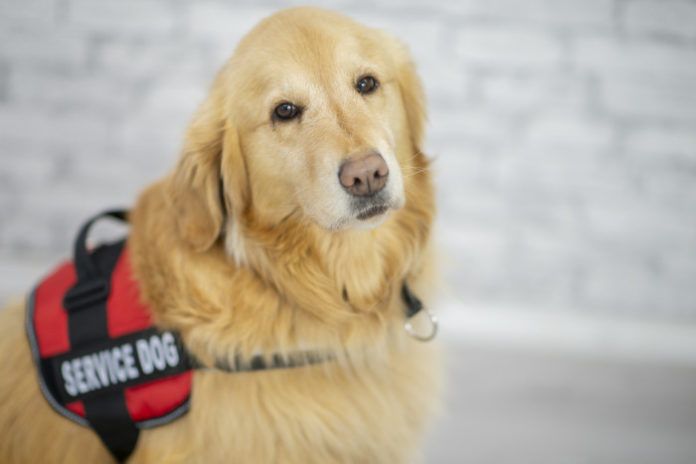I am certain that if you have a child with a chronic and particularly challenging medical condition or behavioral disorder that cannot be readily addressed or resolved, you could become desperate for help – desperate to receive any assistance that you heard good things about. I completely sympathize with parents who are raising a child like this; my heart goes out to them. Unfortunately, some people see them as potential targets for service dog scams.
$20,000 lost to scammers
Several people sent me an article about a single mother in Wisconsin who was duped into raising more than $20,000 for a dog she thought would help ameliorate her son’s aberrant behavior. Her 10-year-old nonverbal son has autism, and often has fits of frustration that make him bang his head or become destructive. The mother, and her son’s social worker, had heard that service dogs could help some children with autism, and they started researching organizations that provide and train service dogs. At some point, the mother learned about an organization in Virginia, called Service Dogs by Warren Retrievers (SDWR), whose representatives promised that they not only train the dogs, but bring the dog to your home and teach the dog and client to work together. That sounded great to the mom, who said that travel with her son is nearly impossible.
The organization also made it easy for friends and family members to help a family in need of a dog meet the high cost of one of their dogs and related services: SDWR provided an online fundraising page to which all donations could be sent, and indicated that when the total amount due was reached, a dog would be forthcoming. But after many months of fundraising and lots of community support, when the target amount – some $20,000 – was reached, SDWR sent only an email, which stated that the family was now on the “wait list” to receive a dog. And not long after, emails sent to SDWR started bouncing back and its phone number was disconnected. Then the family learned the organization had declared bankruptcy. The $20,000 was gone.
This family wasn’t the only one to be scammed by SDWR. It developed that the group had received money from a number of other families, who also never received a dog. The families started a Facebook page in order to communicate with each other and share information about SDWR that might help any of them receive even partial reimbursement through the bankruptcy court. And more families claim that they did receive dogs from the organization who were not only untrained, but unhealthy.
Identify and avoid service dog scams
But here’s the thing: The people behind this organization aren’t the only ones out there scamming families who are desperate for a service dog. This happens frequently. There are numerous unscrupulous people who are selling unhealthy and/or untrained (or poorly trained) dogs and representing them as service dogs.
WDJ Training Editor and long-time trainer Pat Miller wrote about this in an article, “Service Dog Scams,” that we published in the June 2019 issue. The article contains many tips on how to identify and avoid these scams. Make sure that anyone you know who is considering getting a service dog for a vulnerable member of their family has a copy of the article!
Note: Pat’s article was published in the magazine last year, but due to a glitch when we moved 22 years’ worth of issues to a new web service provider last year, it never appeared in the online version of the magazine, and thus, never got as much exposure as it deserved. Forward it to anyone you know who is thinking about a service dog for someone in their family!







That these scams exist is beyond despicable! But among the factors that make it a target rich environment for fraudsters is the web of conflicting laws governing “service,” “emotional support,” and “therapy” animals. I think these are misguided attempts by people who have little understanding of animals or the human animal bond, who are charged with making and enforcing laws to safeguard public health and safety, trying to make rules that classify animals as though they were pieces of equipment instead of living beings, and people with disabilities as though they were “consumers” and not simply people who may be helped by loving and helpful relationships.
If the AKC’s CGC program were universally adopted as an identifier of animals taught to be reliable, clean and safe in public places, more companion dogs would be able to accompany and help – especially of the emotional support variety — people who depend on their company in various ways.
At this point, the program is loosely implemented, with the efficacy of the certificate varying greatly depending on the evaluators’ stringency. and the availability of prep classes and training programs. But I think with some shoring up, it could be a game changer. Actual service dogs trained for specific tasks to assist people with specific disabilities would be a separate and regulated classification. But the temptation to fake credentials for a dog just so you can have him with you would be unnecessary. The CGC badge – and maybe a barcode on it that could verify its legitimacy with the AKC program administrators, would permit a dog to go with her person – just as they have always done, being a friend and helper without needing to make any false claims. The appropriate behavior of the dog and the CGC badge would be their pass. Citations could send a dog with less than acceptable public manners for recertification. But we invite these scams with our less than rational approach to our canine companions’ place in society.
I agree with Laurie Raymond. Over the past 45 years as a Standard Poodle breeder I have placed dogs with
families who have children with disabilities ranging from severe spina bifida to autism. These were not
“service dogs” such as those trained for the blind. That kind of training is very specific and complicated. I call my dogs “helper dogs.” In the case of the child with spina bifida ,so severe she could not sit up or crawl,
her dog learned to bring her things and prop her up to a sit. She even learned to open the fridge and bring
snacks and drinks. It gave the child some control over her life and the emotional component was invaluable.
The autistic child benefitted far more than expected. And there were others as well who did what dogs do for us all, make our lives richer, sometimes easier. These dogs are no less valuable than service dogs and no less necessary for those who come to depend on them but, because they are not actual service dogs they are barred from many public places and transportation. People who fake their dogs’ roles in order to take them places where they are otherwise banned, aren’t helping. I don’t know if the CGC is the right way to designate these dogs but we need to do something. Certainly the CGC is the first step in qualifying these helper dogs but I would like to see something further. I have dogs who passed their CGC but I am not dependent on them. These dogs have functions beyond the CGC. I would love to see AKC come up with something new.
I think AKC CGC is the first step in training a dog for public access or emotional support. I trained my dog as a Hearing Assistant and we have the basic CGC, AKC Community and AKC Urban (which is the same as most public access tests I have seen in programs). We have over 1000 hours of training over several years that I have documented. Specific task training for hearing assistance as well as obedience training following IAADP and ADI guidelines. We also attended a weekly outdoor All Breed Obedience Training Class. It’s a slow process and I was very frustrated because I could not find help from local programs. I spent many hours reading from sources online before I was comfortable with our training plan. I encourage dog owners to train and take the AKC exams. Do I think AKC needs to be the authority to “certify” or “register” service dogs? No. IAADP and ADI have outlined minimum training for public access. It’s a good place to start.
Assistance Dogs International, Inc. (ADI) is a worldwide coalition of not-for-profit programs that train and place Assistance Dogs. ADI Standards have become the benchmarks to measure excellence in the assistance dog industry.
I would only obtain a service dog from an ADI certified organization.
Thank you for the good information I appreciate it!!
The 5 main scammers are Ry-con Service Dogs, Service Dogs by Warren (SDWR), Train and Maintain, Jon Sabin’s Seizure Alert German Shepherds, and Diabetic Alert Dogs of America in Las Vegas. These people are targeting families that have a severely disabled child and give the parent so-called hope that turn out be false and full of lies when they pocket the thousands of dollars from the disabled child’s parents or te the disabled person that asked and begged or Done fundraisers or sold family hair looms or taken a bank loan for the much-needed life saving MEDICAL EQUIPMENT which known as a Service Dog. If they don’t get a dog that normally aggressive, not trained, or whatever or don’t give you the dog and pocket your money anyways and tell you don’t qualify and there is no refund because it was for getting a waitlist or some kind BS. Also, there are AKC Breeders now getting to scam list and they see dollar signs when a disabled person or a parent of a disabled child contacts them looking for a Service Dog Medical Equipment and theses breeders claim they breed Service Dogs in the past and they will send them a puppy and when it 6 months the breeder will tell them they have a trainer that will come and training it but the6 have to make a Service Dog Training payment for an x-amount and they also claim theses puppies have the right special temperaments and the puppy alone is $15,000.00+ alone on to of the $25,000.00(give or take downpayment for the Service Dog Training from their hired trainer which there is none). This $$$$$$$ preying on the vulnerable disabled adults and children need to stop and these people should be charged and made to pay back they stolen from the disabled. The disabled are not not someones’s personal ATM machines or cash cows. People like. This should be ciated 1 million dollars for each disabled person and child they stolen from and they should be made to buy a REAL TASK TRAINED SERVICE DOG each disabled person and child they stolen from or sold a FAKE SERVICE DOG.
You said “MEDICAL EQUIPMENT which known as a Service Dog”
Dogs are NOT medical equipment. They are living, feeling beings and absolutely must be treated and respected as such. While service dogs are a lifeline and companion to many, I’ve seen a number of people with service dogs (at dog training conferences!) who treat them quite harshly and my heart breaks for those dogs who are doing their best to meet unreasonable expectations or who are punished for normal dog behavior (like scratching). There are not enough people asking if the Service Dog industry is good for dogs – breeding massive numbers with low percentages of those dogs succeeding, providing dogs to people who tether them to autistic children, or not educating clients who have unreasonable expectations of a service dog. Everyone gets gushy over what service dogs can do for people – and they should! – but there needs to be more oversight on whether this is good for the individual dog and for dogs in general.
I have to thank you for the efforts you have put in writing this website.
I really hope to see the same high-grade content from you later
on as well. In fact, your creative writing abilities has encouraged me to get my
own site now 😉
An impressive share! I’ve just forwarded this onto
a friend who has been conducting a little research on this.
And he actually bought me dinner because I discovered it for him…
lol. So let me reword this…. Thank YOU for the meal!!
But yeah, thanks for spending some time
to talk about this matter here on your blog.
Quality articles is the key to interest the users to pay a visit the website,
that’s what this website is providing.
This paragraph is in fact a good one it assists new web people, who are
wishing in favor of blogging.
Thanks for every other informative web site. The place else may I
am getting that kind of info written in such an ideal way?
I’ve a undertaking that I’m just now working on, and I’ve been at the glance out for such information.
Have you ever thought about writing an e-book or guest authoring on other sites?
I have a blog based on the same topics you discuss and would really like to
have you share some stories/information. I know my readers would appreciate your work.
If you are even remotely interested, feel free to shoot me an e-mail.
What’s up everyone, it’s my first go to see at
this website, and article is really fruitful in support of
me, keep up posting these types of articles or
reviews.
Thanks a bunch for sharing this with all people you actually
understand what you are talking about! Bookmarked.
Please also visit my site =). We will have a hyperlink alternate contract between us
It’s amazing to visit this site and reading the views of all colleagues
regarding this piece of writing, while I am also eager of getting
knowledge.
I don’t even understand how I stopped up right here, however I thought this submit was once good.
I don’t recognise who you might be however certainly you
are going to a well-known blogger in the event you aren’t
already. Cheers!
With havin so much content and articles do you ever run into any issues of
plagorism or copyright violation? My site has a lot of unique content I’ve either
created myself or outsourced but it seems a lot of it is popping it up
all over the web without my permission. Do you know any ways to help
protect against content from being stolen? I’d certainly appreciate it.
Wonderful, what a webpage it is! This blog provides
valuable facts to us, keep it up.
It’s an amazing paragraph in support of all the web people;
they will obtain advantage from it I am sure.
Please let me know if you’re looking for a article writer for
your blog. You have some really good posts and I think I
would be a good asset. If you ever want to take some of the load off, I’d absolutely love to write some articles for
your blog in exchange for a link back to mine.
Please blast me an e-mail if interested. Many thanks!